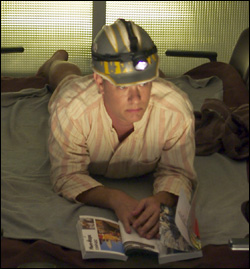In his UCLA screenwriting class, Sacha Gervasi was an alien in several senses of the word: He was the only foreigner, the only former London Sunday Times writer, the only ex-drummer of the band Bush, and the only guy whose film career began with a biopic adaptation of his long interview with short Herve Villechaize, who committed suicide promptly thereafter. That one hasn’t been filmed, but mere months after Gervasi dreamed up a silly script over lunch about a Scottish hairdresser who makes it big in L.A., his debut was in multiplexes: The Big Tease. Co-writer Gervasi’s sophomore effort, The Terminal (which opens Friday, June 18 at the Guild 45 and others), is the latest opus from the Dreamworks dream team, Steven Spielberg and Tom Hanks.
It’s another Gervasian fable about a naive yet plucky foreigner conquering America by the sheer force of his good heart. Hanks plays Viktor Navorski, who flies into New York from the fictional Balkan nation of Krakozhia on a mysterious mission that somehow involves the jar of peanuts he clutches as if it were the Grail. Not quite into New York, however. As he’s being quizzed at customs, Krakozhia succumbs to a coup, and Viktor is transformed into a bureaucratic unperson, an alien without a country. Homeland Security official Frank Dixon (Stanley Tucci) tries to break it to him gently: His visa is now invalid, and he’s not going anywhere outside the airport terminal until there’s a new Krakozhian government to grant him a new one.
On the airport TVs, tanks chase refugees through the streets of Krakozhia. “What I do?” asks Viktor, whose English is too bad for him to grasp his plight. “There’s only one thing you can do here, Mr. Navorski,” says Dixon. “Shop!”
Welcome to America! Spielberg masterfully makes the terminal a character in its own right, a bright, bland emporium of name-brand culture—not the ’60s pleasure palace Leo DiCaprio played like an erotic pinball machine in Catch Me if You Can, but an inescapable enclosure, a bit like the haunted house in Poltergeist or the totalitarian dystopias of AI and Minority Report, an implacably embracing place that’s middle-class, muddle crass, and virtually impossible to outwit.
Viktor adapts like the hero of Cast Away, only there’s much more to work with than a volleyball. He figures out how to scam quarters from machines, carves a campsite out of a deserted airport gate under construction, and uses rest-room sinks as showers. He half-learns English by comparing Russian and English editions of a New York guidebook, and studies CNN news crawls, a technique he might’ve learned from Darryl Hannah in Hanks’ breakthrough movie, Splash.
The people racing for their planes look right through him; one point of the movie is the way natives treat foreigners as unpersons in a larger sense. The terminal’s other unpersons—ethnic airport workers—regard him with suspicion at first. Of course, his indefatigable goodness irresistibly infiltrates their lives. He plays Miles Standish for a food worker who pines to marry the girl who stamps Viktor’s visa application DECLINED each day; he rescues a Russian in a violent confrontation with Dixon by acting as interpreter; and he gets invited to the ethnic workers’ midnight poker game with passengers’ forgotten possessions as the pot. One item found in the VIP lounge: Cher’s panties. “I . . . share the panties?” asks Viktor, whose English never gets perfect.
When a dishy flight attendant (Catherine Zeta-Jones, looking stunningly unmatronly) literally falls into his lap, the movie raises the welcome possibility that she may share the contents of hers. But it’s pretty much a big tease. The romance is unconsummated, and so are most of the film’s many subplots. We meet cool folks—a paranoid janitor from India, dear hearts and generically gentle people behind numerous counters— without getting their stories resolved. It’s a series of separate, extraordinarily improbable incidents not smoothly linked in progression to a narrative goal. The disorganization of the script intensifies a problem The Terminal shares with any captivity movie, the challenge of warding off audience claustrophobia. It’s hard to do the essential movie thing—cut to a new location. Worse, the tale doesn’t give us a sense of a destination: The peanut jar is a muffed Macguffin, a plot gimmick that doesn’t contain much in the way of satisfying revelation.
Spielberg mitigates the problems better than Gervasi et al. do. As always, light dances to his magic wand, bathing and haloing lovers and a sainted jazz musician, harshly flaring behind Dixon’s head, inhumanly obscuring his face. Viktor starts out walking into plate-glass doors in superbly executed pratfalls; when he’s gotten more terminal-adapted, he seeks a suit for a date with Zeta-Jones by standing at the Hugo Boss window, skillfully superimposing his reflected head on the mannequins. He shops, therefore he’s American. The shots are as technically suave as Viktor’s new cosmopolitan self. Props to cinematographer Janusz Kaminski.
Hanks was startlingly bad as a Southern crook in the Coen Brothers’ recent The Ladykillers, but his stumbling accent sings here, and his performance carries the movie. He’s back to what he does best, the sweet, silly, wise savior of mankind. Most of the movie’s other performances are on the money, though without hitting jackpots.
Spielberg doesn’t quite hit the jackpot, either, but he’s as clever at extracting laughs and “Awwwws” from the situation as Viktor is at getting quarters out of the luggage-cart machine. The Terminal is another slight effort by a master, like Catch Me if You Can, a bracing palate cleanser between main courses. He’ll whip up another blockbuster masterpiece any minute. In the meantime, this amusing divertissement should tide us over for a while.








